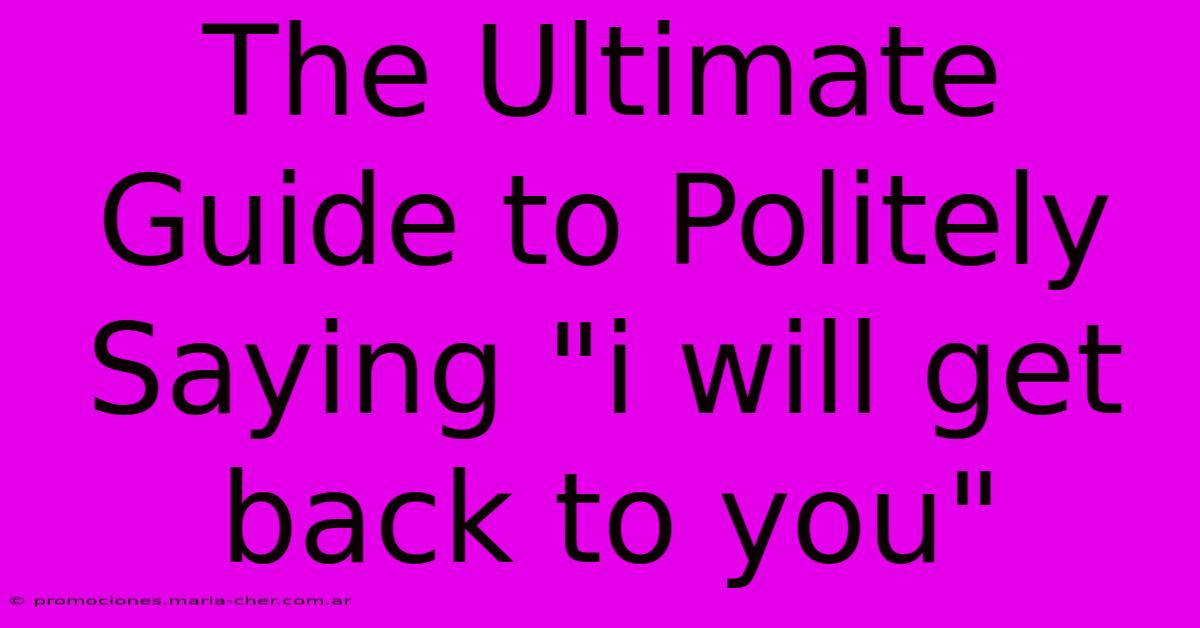The Ultimate Guide To Politely Saying "i Will Get Back To You"

Table of Contents
The Ultimate Guide to Politely Saying "I Will Get Back to You"
In today's fast-paced world, responding promptly to every communication can feel impossible. But ignoring messages isn't an option. Knowing how to politely say "I will get back to you" is a crucial professional and social skill. This guide provides you with the ultimate strategies for crafting the perfect response, ensuring you maintain positive relationships while managing your time effectively.
Why "I'll Get Back to You" is Essential
Saying "I'll get back to you" (or its variations) serves several important purposes:
- Acknowledges the message: It shows the sender that you've received their communication and haven't simply overlooked it.
- Sets expectations: It lets the sender know when they can reasonably expect a response, preventing anxious waiting.
- Manages your workload: It allows you to prioritize tasks and respond thoughtfully, rather than rushing a reply.
- Maintains professionalism: A polite and timely acknowledgment reflects well on you and your professionalism.
Mastering the Art of the "Get Back to You" Response
The key is to tailor your response to the context. Here's a breakdown of different scenarios and how to handle them:
1. The Quick Acknowledgement (for emails and less urgent messages)
For quick acknowledgments, brevity is key:
- "Thanks for your email. I'll get back to you by [time/date]."
- "Received. Will respond by end of day."
- "Appreciate you reaching out. I'll get back to you shortly."
Pro-Tip: Always specify a timeframe whenever possible. Vague promises like "soon" or "later" can be frustrating.
2. The More Detailed Response (for important or complex inquiries)
If the message requires more time or consideration, a more detailed response is appropriate:
- "Thank you for your email. This requires some careful consideration, and I'll get back to you with a comprehensive response by [date]."
- "I appreciate you bringing this to my attention. I'll need some time to gather the necessary information before responding, but I expect to get back to you by [date]."
- "This is a great question! I'll need to do some research before I can give you a complete answer. I aim to get back to you within [timeframe]."
Pro-Tip: Be realistic with your timeframe. It's better to slightly overestimate than to miss your self-imposed deadline.
3. The Urgent Situation (when immediate action isn't possible)
If the matter is urgent but you can't respond immediately, be upfront:
- "Thank you for reaching out. I understand this is urgent. While I can't address this right away, I will prioritize it and get back to you within [shorter timeframe]."
- "I've received your urgent request. I'm currently dealing with another pressing matter, but I'll respond within the next [timeframe]. Please let me know if there's anything more critical in the meantime."
Pro-Tip: Offer an alternative contact if appropriate, like "Please contact [colleague's name] for immediate assistance."
4. The Follow-Up (when you haven't yet had time to respond)
If you've missed your initial self-imposed deadline:
- "I apologize for the delay in getting back to you. I've been dealing with [brief explanation – keep it concise]. I'll respond within [new timeframe]."
- "My apologies for the delay in responding to your email. I’m working on your request now and will get back to you by [new timeframe]."
Pro-Tip: A sincere apology goes a long way in mitigating any frustration caused by a delayed response.
Phrases to Avoid
- "I'll get back to you ASAP": ASAP is vague and doesn't set clear expectations.
- "Let me look into it": While not inherently bad, it's often followed by silence. Pair it with a timeframe.
- Ignoring messages entirely: This is the worst option. Always acknowledge the message, even if you can't respond immediately.
Beyond the Words: The Importance of Action
Remember, saying "I'll get back to you" is only half the battle. Follow through! Make sure you actually respond within the timeframe you've promised. This builds trust and strengthens relationships.
By mastering these techniques, you can confidently and politely manage your communications while maintaining positive relationships both professionally and personally. This guide empowers you to navigate the complexities of modern communication with grace and efficiency.

Thank you for visiting our website wich cover about The Ultimate Guide To Politely Saying "i Will Get Back To You". We hope the information provided has been useful to you. Feel free to contact us if you have any questions or need further assistance. See you next time and dont miss to bookmark.
Featured Posts
-
Active Voice The Secret Weapon For Serp Domination Vs Passive Voice The Nemesis Of Writing Success
Feb 09, 2025
-
Master The Art Of Professional Communication With I Will Get Back To You
Feb 09, 2025
-
The Astonishing Damned Souls That Roam The Earth
Feb 09, 2025
-
Cash Saving Hacks How To Navigate Tonsillectomy Expenses Like A Pro
Feb 09, 2025
-
Elevate Your Email Game Unlocking The Power Of Effective Thank You Responses
Feb 09, 2025
